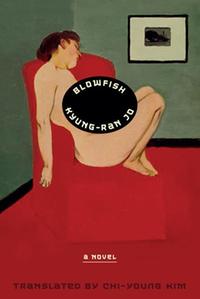
 Korean author Kyung-Ran Jo and literary translator Chi-Young Kim collaborate again after Jo's English debut, Tongue (2009), for Blowfish, a remarkably lyrical examination of the consequences after suicide, a tragic detail shared by two strangers who hesitantly develop a cautious bond. In alternating chapters, Jo achingly reveals their tragic pasts while building a multilayered connection.
Korean author Kyung-Ran Jo and literary translator Chi-Young Kim collaborate again after Jo's English debut, Tongue (2009), for Blowfish, a remarkably lyrical examination of the consequences after suicide, a tragic detail shared by two strangers who hesitantly develop a cautious bond. In alternating chapters, Jo achingly reveals their tragic pasts while building a multilayered connection.
She's a sculptor living in Seoul. Leaving her just-opened exhibition, she decides, "I'm ready now... I'm done thinking": she's resolved to end her life. Accepting an art residency invitation in Tokyo provides the opportunity to avoid burdening anyone at home. She arrives at "Number 605, 3-5-19, Negishi, Taitō-ku, Tokyo. Her final address on this planet." After arranging an appointment for a death cleaner, she carries her own chair to Ueno Park where she's carefully chosen a Kwanzan cherry tree. Shockingly, she's greeted by her late grandmother, sitting "at the very top, on the highest, thickest branch." Her grandmother's violent suicide--by blowfish soup--which happened before the sculptor's birth, has tormented her subsequent generations. Now she confronts her granddaughter: "I wanted to see my son's daughter, just once. Before you die." The interruption temporarily delays the sculptor's careful plans, but she merely changes methods, embarking on a meticulous study of blowfish.
He's a Korean architect living in Tokyo. His travel between Seoul and Tokyo is a common commute. After making a phone call to the architect, "his brother had jumped to his death from his apartment window on the fifth floor." The architect is haunted by his previous careless remark: "If you really wanted to fall to your death, you could do it from the third floor." The surviving family remains paralyzed by loss.
The sculptor and the architect met briefly in Seoul at a dinner hosted by a mutual colleague. He recognizes her when she visits Tokyo Tower but, more importantly, notices her because "she was fearlessly blank, having given up the most important thing in life"--not unlike his brother. For a time, that unexpected reunion engenders a tentative almost-relationship.
Initially published in 2010, Blowfish is composed with a simmering desperation Jo manages with impressive control; Kim is again a splendid translator. Jo's author's note mirrors her protagonist's "sadness and beauty and fear and death," as if the sculptor's longing to create despite everything else, is also her own: "What I want is a simple life, one in which I can think and read and write." Jo's complex exploration of living and dying becomes a mindful journey toward possibilities. --Terry Hong
Shelf Talker: Kyung-ran Jo hauntingly, gorgeously, explores a cautious, hesitant relationship between two strangers drawn together by legacies of suicide.

